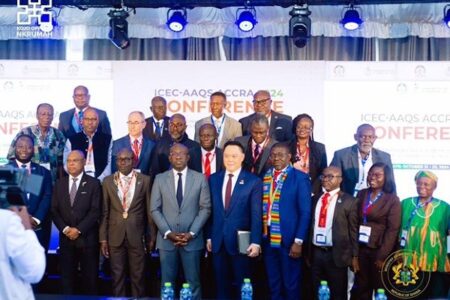Minister for Works and Housing, Kojo Oppong Nkrumah, has urged quantity surveyors, cost engineers, and other industry professionals to adopt sustainable and technology-driven approaches to construction cost management.
Speaking at the opening ceremony of the 2024 International Cost Engineering Council and the Africa Association of Quantity Surveyors (ICECAAQS) Conference in Accra, Mr. Oppong Nkrumah called for greater collaboration between the public and private sectors to redefine traditional practices in the construction industry.
Themed, “Reimagining the Future of Construction Cost Management: Sustainability & The Digital Frontier,” the three-day conference, drew over 300 participants from various industries, to deliberate on the future of cost management within the context of sustainability and digital innovation.
Addressing the gathering, Mr. Oppong Nkrumah emphasised the importance of integrating environmental stewardship and technological advancements into construction cost management, arguing that these factors are critical in ensuring both financial efficiency and sustainable development.
He noted that the intersection of sustainability, technology, and cost management is where the future of the construction industry lies.
The Minister highlighted the need for innovative financial products tailored to address the specific needs of modern construction projects, particularly in managing cash flow.
He called on the Ghana Institution of Surveyors and the broader quantity surveying community to collaborate with financial institutions to design adaptive solutions that can mitigate financial risks and enhance project delivery.
“Effective and sustainable project delivery hinges on sound financial strategies. I charge the Ghana Institution of Surveyors and the quantity surveying community to work closely with our financial and insurance institutions to design innovative financial products tailored to the construction industry,” he urged.
Mr. Oppong Nkrumah also underscored the growing necessity of sustainability in construction, pointing out that buildings and infrastructure are significant contributors to global carbon emissions. He said the industry needs decisive actions to decarbonise the built environment, stressing that the construction industry has a responsibility to lead the way in this effort.
“Sustainability is no longer a choice; it has become a necessity. We must take bold steps to decarbonise our built environment. Our focus must extend beyond the initial construction phase to the entire life cycle of a building—managing not only upfront costs but also long-term operational and maintenance expenses,” he explained.
He revealed, that the Ministry of Works and Housing, with support from international partners such as the United Nations Office for Project Services (UNOPS), has developed a comprehensive roadmap to decarbonise Ghana’s building and construction industry. This roadmap is expected to be officially launched in the coming days.
Source:dailyguidenetwork.com

